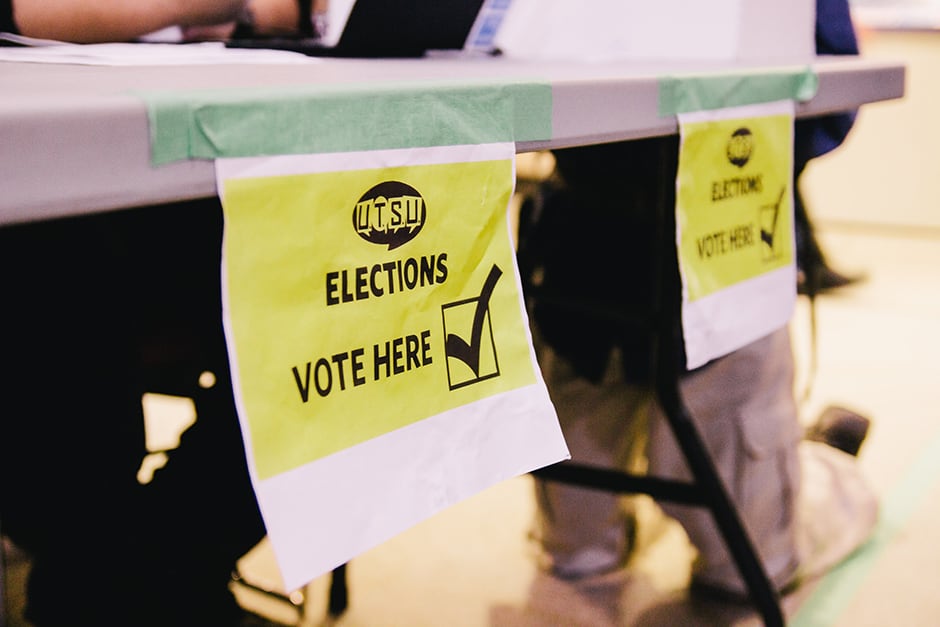[dropcap]A[/dropcap] post-mortem analysis of the recent University of Toronto Students’ Union (UTSU) spring elections reveals a series of insights on the evolution of campus politics over the years: most notably, the increasing role politeness and geniality, rather than substance and pragmatism have come to play in campaigning.
The recent history of union elections is checkered with conflicts that have typically hinged on significant and divisive issues; the threat of divisional defederation comes to mind. Much of that discourse was difficult, some of it bordered on ad-hominem attack, but the impassioned debate overwhelmingly had the best interests of students at heart.
That tradition seems to have entirely given up the ghost however, as this campaign season was the most vapid in some time. No one misses histrionics of the past when it comes to debate performances or campaign statements, but something vital was lost with the bathwater as this year’s candidates wasted opportunities to scrutinize one another on specifics.
Few of the candidates were willing to engage with the details of their campaign promises, many chose instead to pay brief lip service to the core mandate while focusing on grandiose ideals.
Providing for medical and dental coverage, consulting with administration on academic life, protecting and promoting equity, and advocating for student issues are important and valued contributions, though they reflect the limit of what the union can realistically achieve. Propositions such as bringing about free tuition province wide, constructing and staffing a 24-hour mental health centre on campus, or bringing international students coverage under the Ontario Health Insurance Plan (OHIP) are not promises, they are platitudes. Airing the notion that projects of this magnitude fall under the UTSU’s purview and potential is not only foolhardy, it’s irresponsible.
Proposals like these reveal some insidious trends in UTSU electioneering: either the candidates include them in their platforms knowing full well that they are unachievable, or they don’t know and haven’t taken the time to look into it. Both are bad.
Unfortunately, the only incisive questioning during the Executive Debate came from the moderators and audience, most of which went unanswered.
The issue is complicated further by an undergirding skepticism and distrust of the provincial government and U of T administration. Often, prospective student leaders hurl vitriol at these bodies in an attempt to scapegoat and draw undeserved attention to the power and purpose of the student movement.
Yet, the administration and government are not necessarily the enemy, and certainly aren’t worth provoking with contemptuous grandstanding. The reality of the situation is that the success of anything the UTSU hopes to achieve in a given year, big or small, is inextricably linked to decisions made by these groups. The provincial government and U of T administration are not intransigent gatekeepers. They are our partners.
Bombastic promises like the ones thrown around during the Executive Debate and throughout the campaign represent little more than diversions, drawing focus away from the big-picture impotence of the union, and in some cases the lack of preparedness of the candidates.
It certainly isn’t a new phenomenon, nor is it one that is unique to student politics, but that is not reason enough to excuse it in our community. There are meaningful and substantial things the UTSU can achieve, but those things tend to take a back seat when candidates are fighting for the lion’s share of support.
Building a platform on unreasonable, or in some cases unattainable ideals is irresponsible and part and parcel of the UTSU’s mandate crisis — 9.7 per cent of eligible voters participated in last week’s elections —insofar as students are not willing to engage or endorse leaders without realistic plans.
This bankruptcy of substance is a disappointing turn of events for the UTSU after a year that was shepherded in with high hopes. Brighter UofT ran on a pledge to clean house and initiate a process of responsive and responsible governance — though in recent months the union and especially its returning executives have remained hard to pin on the outstanding question of membership in the Canadian Federation of Students (CFS), which most will remember was implicitly at the core of their run for office.
When pushed on the topic at the Executive Debate, now president elect, Denike and 1UofT candidate, Madina Siddiqui were expectedly non-committal, offering some variation on the “whatever the students want” response. The students, at least the ones still willing to participate, handed the UTSU a pretty clear indication of their wants last year when Brighter was elected and a CFS affiliated, slow-to-act cycle of incumbencies was brought to an end. As of yet, the implicit promise at the heart of Brighter’s success last year remains unfulfilled.
If the UTSU wants to make itself more relevant on campus, it can start by engaging students in a responsible way during elections with respect to what can be achieved, and how.


